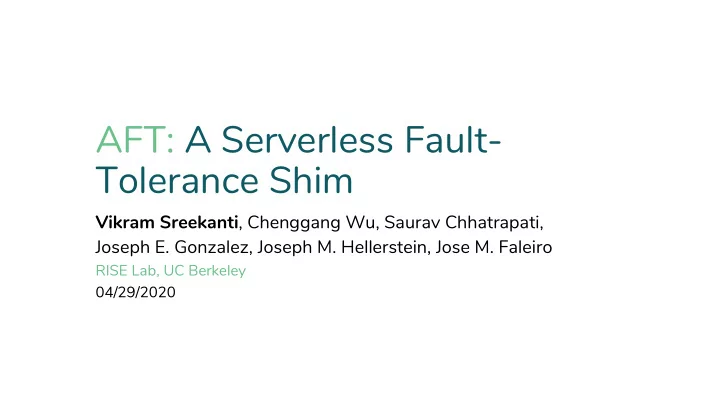

AFT: A Serverless Fault- Tolerance Shim Vikram Sreekanti , Chenggang Wu, Saurav Chhatrapati, Joseph E. Gonzalez, Joseph M. Hellerstein, Jose M. Faleiro RISE Lab, UC Berkeley 04/29/2020
Fault-Tolerance in Serverless Computing • FaaS programs with shared state raise concerns about faults What happens when What happens when What is the contract with infrastructure fails functions fail mid-flight? the user? between functions?
Semantic Goals for Stateful FaaS • Understandable: exactly-once executions • State of play for commercial FaaS: at-least once execution • Advice: Roll your own idempotence – difficult to reason about! • But idempotence is not enough! • Fractional executions can leak partial side effects • What else do we need? Atomicity!
Partial Executions: 0.5? • Retries – even if idempotent – can expose partial executions • Make some results of a function visible but not all Request 1 Request 2 W(A 1 ) W(A 1 ) W(B 1 ) R(A) A 0 B 0 R(B)
Partial Executions: 0.5? • Retries – even if idempotent – can expose partial executions • Make some results of a function visible but not all Request 1 Request 2 W(A 1 ) W(A 1 ) ERROR R(A) A 1 B 0 R(B)
Partial Executions: 0.5? • Retries – even if idempotent – can expose partial executions • Make some results of a function visible but not all Request 1 Request 2 W(A 1 ) W(A 1 ) A 1 ERROR R(A) A 1 B 0 R(B) B 0
AFT: A Serverless Fault-Tolerance Shim • Goal: Exactly-once transactions for FaaS with minimal code changes • Design • Transparent fault-tolerance for FaaS runtimes • Implements new protocols for read atomic isolation • Results • Low overheads compared to standard cloud deployments • Highly scalable
The Bigger Picture • Part of a broader stack in the RISE Lab: the Hydro Project • Check out our long talk for more details! hydro-project.github.io
Recommend
More recommend